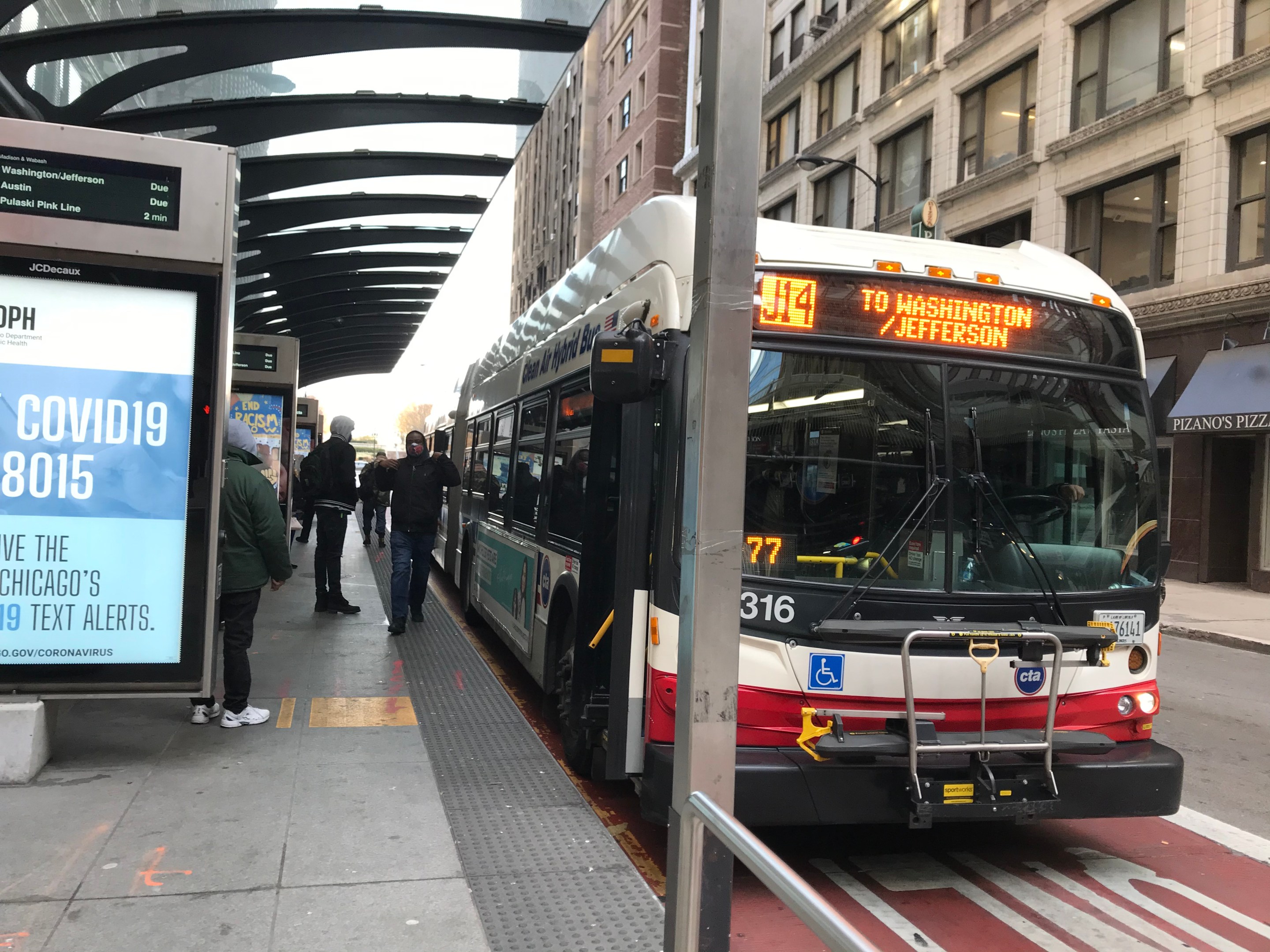Last week, the Active Transportation Alliance gathered seven leaders in transportation advocacy, legislation, management, and labor to discuss the crisis facing transit systems nationwide as the pandemic rages on: potentially catastrophic funding shortfalls that, without significant additional federal aid, could result in service cuts affecting millions. The players in the virtual room could easily have warranted a full day of discussion, but the forum was held to a tight 90 minutes focused on the impact funding shortfalls would have on already underserved Black and Brown communities on the South and West sides -- home to the majority of frontline workers who rely on transit to get to essential jobs in healthcare, service and, yes, public transportation.
ATA advocacy manager Lynda Lopez framed the conversation with a few figures. Pre-pandemic, 1.5 million people took the CTA on an average weekday in Chicago, and 60 percent of riders were people of color. $32 billion in federal aid is needed for transit nationwide is to prevent potentially drastic cuts in service that would disproportionately affect communities of color and essential workers.
W. Robert Schultz III, campaign organizer for ATA, introduced Congressman Jesus “Chuy” Garcia, who serves on the House Committee on Transportation and Infrastructure. Garcia gave an impassioned call for building a grassroots movement for pubic transportation, as mobilized and visible as those for the environment and racial justice. “Congress is reactionary,” he said. “They are not compelled to change the status quo. Are pro-transportation advocates effectively communicating this is an equity issue?”
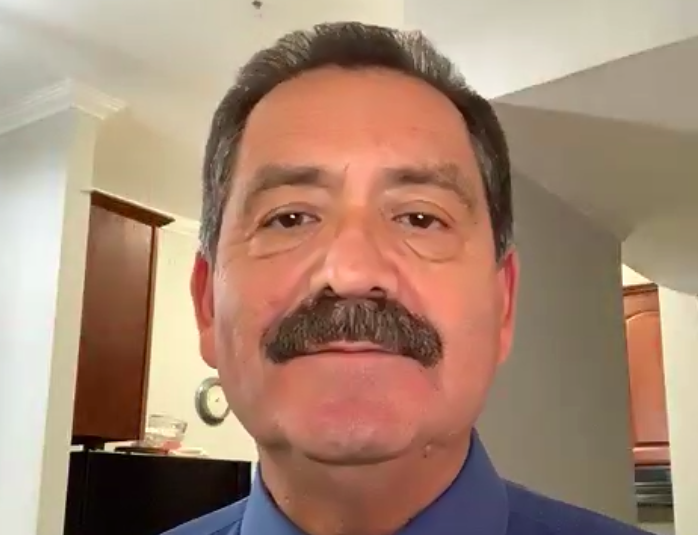
Schultz asked the congressman to speak about the health and ecological benefits of public transportation, pointing out how communities of color are disproportionately impacted by traffic pollution. Garcia noted that a safe, clean, reliable public transportation system has positive impacts on the environment, public health and the economy, and stated his support of equitable transit-oriented development as a solution to housing displacement due to gentrification.
Garcia said he is optimistic about the incoming presidential administration and the possibility of a new infrastructure bill that would meaningfully invest in public transportation, and again encouraged people to contact their federal and state legislators to voice support.
Lopez took the screen to introduce five transit justice principles recently defined by a national coalition of transit advocates as a driver for local, state and federal policy. The principles state that Americans need transit that is equitable, sustainable, economically productive, safe and accessible, and affordable. This vision for a just transit system was apt introduction for the next three speakers, activists from Garfield Park and North Lawndale who illustrated how far Chicago’s public transportation system has to go to make just transit a reality.
Jason S. Ferguson of the Garfield Park Community Council spoke to the lack of reliable transportation for essential workers, particularly discontinued bus lines and transit shutdowns during periods of civil unrest earlier this year that left workers stranded. Ferguson also expressed concern about safety on the Blue and Green Lines passing through parts of the South and West sides, and stated the need for fare relief during the pandemic.
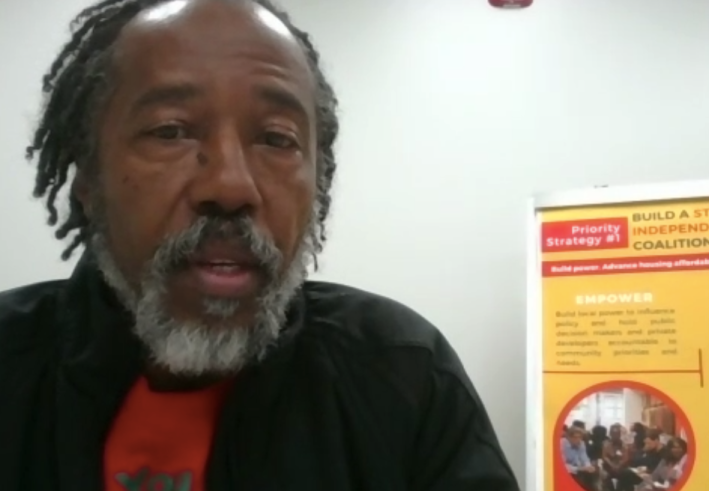
Rochelle Jackson of the North Lawndale Community Coordinating Council echoed Ferguson’s concerns, and presented a list of issues that fleshed just how inequitable public transportation in Chicago is. Jackson described how service cuts to the #157 Ogden bus severed access to the medical district to residents west of California Avenue. Health care workers and people seeking medical care have been forced to triangulate their journey across two to three buses. The westernmost end route was recently reinstated, but only as part of a six-month pilot program. Jackson feared the drop in ridership from the pandemic would make the pilot appear to be a failure and that her neighborhood would lose this bus route, possibly more.
Jackson provided a list of safety concerns for riders and operators alike, from crumbling, unsheltered, and unlit bus stops to dimly lit and neglected rest areas for CTA operators. She concluded her statement, “We want to be safe too. We deserve to be safe.”
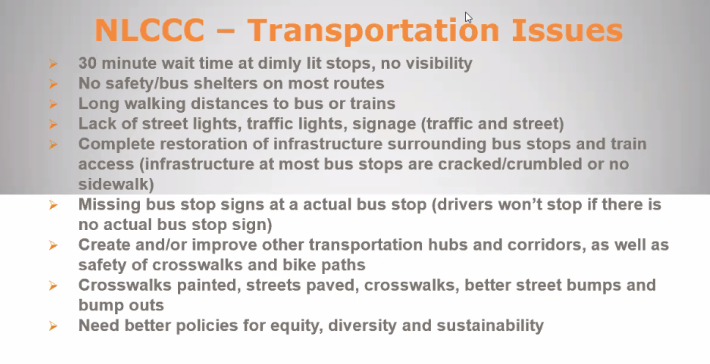
Oboi Reed, Jackson’s colleague at NLCCC and founder of the mobility justice nonprofit Equiticity, made a direct call for racial equity in Chicago’s transit system. Reed began with pre-COVID statistics: Commute times for Chicagoans of color were, on average, three to seven minutes longer than white residents -- the equivalent of an additional full work week per year. That asthma rates are 50 percent higher for children living close to highways, the majority of whom are people of color, living in low-income areas.
Reed then outlined the necessity and methods to go beyond simply mending a transit deficit to truly address the effects of longstanding disinvestment. “Let’s ensure that transit in our region is targeting and prioritizing those who need it the most,” he said. “In Chicago, that is Black and Brown people. That is low-to-moderate-income people.”
Reed called for just allocation of resources and community ownership of planning processes and emphasized the role of policy in sustaining and moving racially just transportation reforms forward. “Do not leave a commitment to racial equity and mobility justice to well-meaning people,” he said. “Well-meaning people come and go. I’m much more confident the work would be sustained when it’s baked in policy.”
Gerasimenko then introduced Ken Franklin, president of Amalgamated Transit Union Local 308, which represents rail employees; and Keith Hill, president of ATU241, representing CTA and Pace bus drivers. Franklin opened by saying, “I have goosebumps because what I see here is that dots have been connected to fight for federal funding.” Franklin said he is also optimistic about the future of transit under the Biden administration.
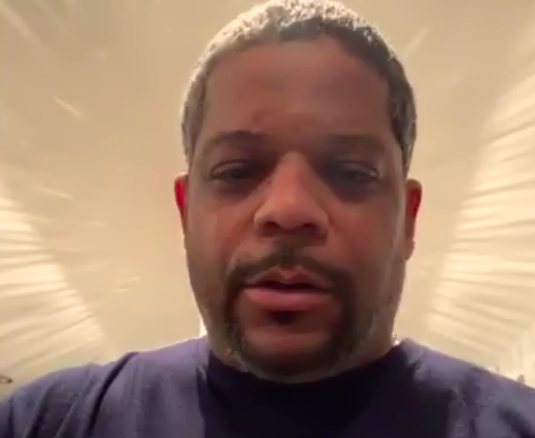
Franklin talked about the stress COVID-19 has put public transportation workers, and exacerbated what he deems to be inequities in scheduling. “We have operators that work 12 hour shifts,” he said. “If you add an hour or two hours on for [commute] traveling, that’s a contractual fight we have to have, to get rid of runs I consider to be racist. I seriously encourage everyone to think about reinvestment in the workforce. Medical care for operators who run the trains and buses all day is very important.”
Hill followed with a rousing call for expansion of service. “At three in the morning, when you have Black and Brown men and women, rain, sleet or snow, riding a bike to a bus stop because they don’t want to walk 10, 12 blocks to a bus, that is a transit desert,” he said. “We can’t take more service cuts. We can’t. That stimulus package only address a smidgeon of what we need for transportation. If COVID has taught us anything, it’s that transit needs to be cleaner, safer…we deserve to be able to get to and from school, to and from work.”

Hill was passionate and animated, noting that insufficient transit was just one facet of greater systemic inequity in Chicago, from inadequate food access and medical care to school closures. At the same time, he was an enthusiastic cheerleader for Chicago’s public transportation system, heralding it more than once as “the best in the world.” The best in the U.S., maybe? All the same, Hill's gusto makes it easy to see why he was elected to represent his local union chapter.
The final speaker was Sam Smith, vice president of legislative affairs at the CTA. “We’re at razor’s edge,” he said of the agency's financial situation. “If we’re not able to receive help from the federal government, things could get very dire. We’re under immense pressure to keep things running.”
During the Q & A, Franklin asked Smith what the CTA’s priorities would be for federal funding. Smith replied that the CTA is committed to completing a multi-billion dollar backlog of infrastructure projects, including the Red Line extension to 130th Street, bridge repairs and other maintenance projects, and implementation of new rail cars. Franklin responded that he hoped a portion of any federal funding be allocated to the workforce. “New trains and new stations won’t mean anything if the workforce is not healthy and able to work safely,” he said.
Lopez closed the forum with an action alert for attendees to contact their congresspersons in support of federal funding for transportation. The forum drew into ever-sharpening focus that without federal assistance, underserved areas of the city will suffer further loss of bus and train service, an overextended public transportation workforce will face cutbacks, and vital maintenance and improvement projects will stall.
